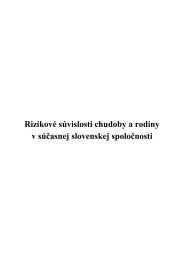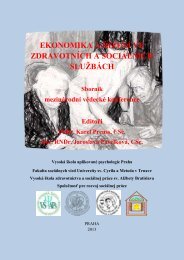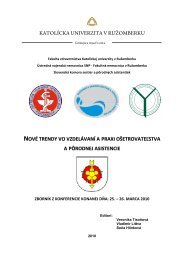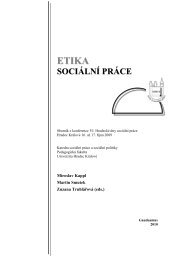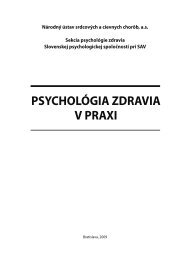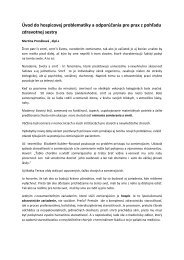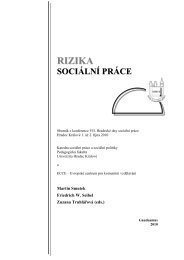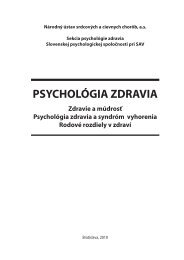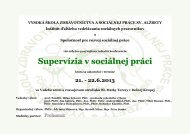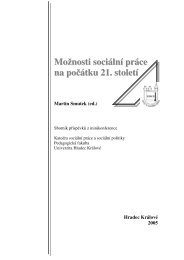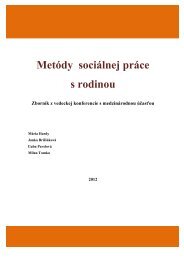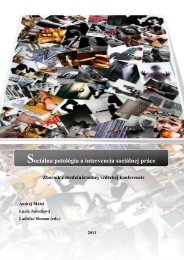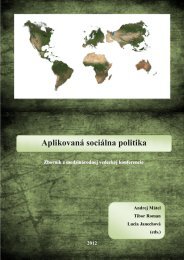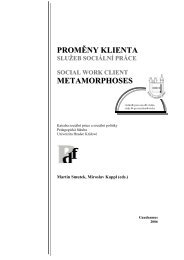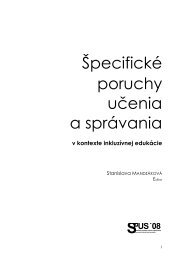Zmena klÃmy â možný dopad (nielen) na obyvateľstvo - Prohuman
Zmena klÃmy â možný dopad (nielen) na obyvateľstvo - Prohuman
Zmena klÃmy â možný dopad (nielen) na obyvateľstvo - Prohuman
You also want an ePaper? Increase the reach of your titles
YUMPU automatically turns print PDFs into web optimized ePapers that Google loves.
LEARNING FOR A SUSTAINABLE, LOW-CARBON FUTURE –<br />
TIME FOR A PARADIGM SHIFT<br />
Darja Piciga<br />
Abstract<br />
The author derives from the assumption that the global challenges in the context<br />
of a knowledge society require such radical changes in thinking and behaviour of<br />
individuals and societies, as probably never before in the human history – which<br />
means learning in the broadest sense. Due to the complexity of these interrelated<br />
problems and threats in the globalised world, an integral, holistic and systemic<br />
knowledge base is urgently needed. Educatio<strong>na</strong>l scientists, practitioners and policy<br />
makers have to be able to team-up with experts from other fields to perform the<br />
paradigm shift in addressing the global learning problem.<br />
A possible framework for this global learning project is offered by the transformative<br />
integral approach, guided by humanism and holism and constructed by Ronnie<br />
Lessem and Alexander Schieffer. The four research-to-innovation paths to Integral<br />
Innovation in society and economy include Southern Relatio<strong>na</strong>l Path (Community<br />
Building – Healing the Planet), Eastern Path of Renewal (Conscious Evolution<br />
– Peaceful Co-evolution of Peoples), Northern Path of Reason (Knowledge Creation<br />
– Open Society), and Western Path of Realization (Sustai<strong>na</strong>ble Development<br />
– Economic Opportunity). Creative synthesis between cultures and between local<br />
(indigenous) wisdom and global (exogenous) knowledge is one of the cornerstones of<br />
this transcultural approach, the others: fusing one discipline with another (transdiscipli<strong>na</strong>rity),<br />
the individual with the community and the past with the future.<br />
It is further argued that in looking for solutions that would give best results in<br />
developing countries one should not only think about transferring and adapting<br />
concepts and practices from Western or Northern cultures to developing countries<br />
but rather about integration that leads to transformative action. This thesis is<br />
supported by practical examples of alter<strong>na</strong>tive models of development that are<br />
economically successful (many already for decades), socially equitable and environmentally<br />
responsible.<br />
The Integral Framework has already been partially applied in the process of developing<br />
the strategy for the transition of Slovenia to a low-carbon society by 2050. The<br />
strategy proposes the vision of Slovenia in 2050 as a highly integrated and inclusive<br />
society with an excellent business sector and a high quality of life, space and<br />
<strong>na</strong>tural environment. Further development of the Low-Carbon Strategy within the<br />
132



